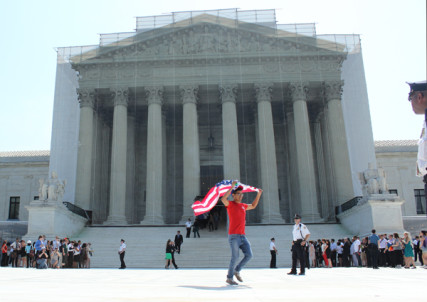
(RNS10-jun26) A man exits the Supreme Court building carrying an American flag after the high court made its rulings on same-sex marriage Wednesday (June 26). For use with RNS-PROP8-DECISION, transmitted on June 26, 2013, RNS photo by Adelle M. Banks.
Human beings disagree. It is inevitable.
Sometimes human beings disagree strongly. That too is inevitable.
Every so often human beings disagree to their very core. This is rare, but apparently also inevitable.
Consider a situation where I disagree with you about subject X, but you don’t feel particularly strongly about it. That may be unpleasant, but it is not a crisis.
Now consider a situation where I disagree to my core with you about subject X, and you disagree to your core with me about the same subject.
By “to my core,” I mean the issue involves my most basic, fundamental, and non-negotiable convictions. These lead me to believe very, very strongly about the subject in question. But then in your “core,” your most basic, fundamental, and important convictions, you believe the opposite thing about the very same subject, and just as strongly.
At the highest pitch of such moral disagreement, our convictions might be said to shock each other’s consciences. I am morally shocked and offended that you believe the way you do. You are just as morally shocked and offended that I believe the way I do. I am literally amazed that you believe what you do. You are literally amazed that I believe what I do. We find each other’s convictions mutually shocking, amazing, incomprehensible, appalling.
After the Supreme Court gay marriage decision last Friday, every communications outlet available to Americans rang with the cries of shocked consciences. More precisely, the decision of the Court to legalize gay marriage nationwide was met with howls of moral shock, which were in turn met with howls of moral counter-shock, which were met with moral counter-counter shock, in an endless loop. Facebook has been especially ripe with mutual conscience-shocking.
Other issues can evoke mutual conscience-shocking: race, war, ecology, poverty, guns, abortion, you name it. But at this moment no arena of mutual conscience-shocking is more visible than in relation to what advocates call “LGBT inclusion” and what people who are morally shocked by that concept prefer to call “normalizing sin” or something like that.
How in the world do we move forward together?
In many cases, “we” will not move forward together. Friendships will break. Family ties will fray, as July 4th cookouts offer unexpected domestic fireworks. Religious bodies may split. In social media land, people will try to communicate for awhile and then either give up or keep firing away in an endless, fruitless loop of mutual accusation and recrimination. (Fruitless loop. Get it?)
But as a nation we must move forward together. Secession was pretty much ruled out as an option after, say, 1865. People can leave the country, I guess. Some will leave public service because what is now required of them shocks their conscience. Some may attempt civil disobedience. Some will attempt an inward emigration of the spirit as they withdraw emotively from the nation that they live in.
As we mark America’s 239th birthday on July 4, we should try to recall that our nation has managed to endure previous divisions over very grave issues. The legitimacy of our constitutional order and its institutions has been reaffirmed repeatedly. We have managed to find sufficient unity to absorb our divisions and move forward with decent civil peace and order. Let us hope we can do that this time.
Meanwhile, there are signs of hope. Even people who are shocked by each other’s convictions are in some cases attempting to talk, to give their own reasons and to listen to the reasons of others. It is hard work because no simple appeal to any single authority or set of authorities settles our issues. We can all cite constitutional law, moral principle, reason, experience, and sacred texts to justify our own views and to communicate shock at those of others — just go online, you can see it this moment.
Still, where people are talking, exploring, listening, trying to understand each other’s beliefs and the reasons for them, this is far better than the alternatives, which run from insults to broken relationships to the possibility of violence.
Maybe mutual conscience-shocking is so upsetting because what is really going on is the shocking (re)discovery that we live in the kind of world where we cannot agree even about the most basic things.
We wish we had an omniscient, maybe even omnipotent umpire who would resolve everything so that everyone would just know the truth. (There’s God, of course; but whose opinion of God’s will shall we take as authoritative?) All we seem to have in the US at this moment are those 9 lawyers in their black robes who have to resolve all our moral disputes. You know, the ones now squabbling bitterly with each other in their conflicting opinions. We are asking too much of them.




